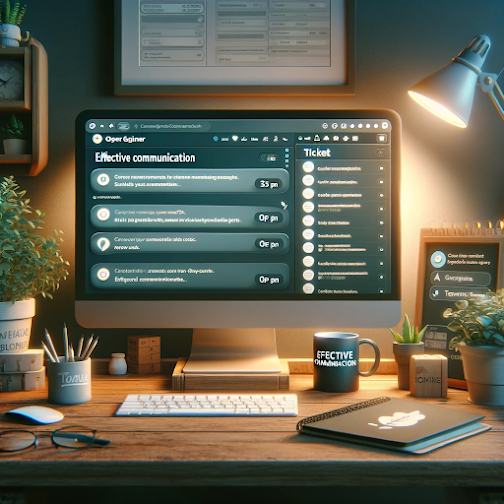In the world of software engineering, tickets aren't just tasks—they're a pivotal communication channel. While coding might be a solitary activity, the development process is inherently collaborative, and effective communication is the bedrock of any successful project. Tickets, whether they track bugs, feature requests, or improvements, are a rich medium for this necessary exchange.
Tickets = Communication
"Have you tried turning it off and on again?" This humorous tech support cliché on a T-shirt, often found in IT departments, signifies more than just a common troubleshooting step; it epitomizes the essence of interaction between users and engineers. Each ticket is an opportunity to engage, understand, and educate. It's vital to acknowledge every ticket, reflecting on the user's needs and demonstrating that their issues are heard.
Scenario of a Ticket Lifecycle
Imagine a user reports an outage. The engineer picks up the ticket and begins the investigation—checking dashboards, verifying cloud services, pondering over a potential Kubernetes issue, and perhaps, humorously, considering lunch. All the while, the user awaits, refreshing their screen, hoping for progress. This scenario underscores the importance of updates. A simple comment or status change can significantly reduce user anxiety and build trust.
Triage: The Art of Prioritization
Drawing parallels from medical emergency rooms, triaging tickets is about urgency and impact. Just like patients with varying degrees of ailments are prioritized, tickets must be assessed and ordered based on severity and business impact. The provided decision table exemplifies this process, categorizing tickets into red, orange, yellow, and green, each with defined criteria for response time and action.
Communicate, Prioritize, and Reflect
Effective ticket management entails several key practices:
- Acknowledge and update: Always add a comment when you start working on a ticket. This shows the customer that their issue is being actively addressed.
- Learn your tools: Master your ticketing system. Knowing all the features can give you an edge in communication and organization.
- Organize and plan: Use tickets to organize your work—prioritize tasks, stories, epics, and milestones. Keep tickets alive and updated.
- Automate and celebrate: Automate updates where possible, and celebrate small victories, breaking down large tasks into smaller, manageable ones.
- Record and collaborate: Treat tickets as a journal for progress and collaboration. This not only aids in tracking but also in team communication.
- Link work to tickets: Establish a habit of connecting actual work to tickets, creating a track record of your work, and reflecting on productivity.
By embracing tickets as a fundamental aspect of communication, software engineers can turn frustration into satisfaction, ensuring that users don't just receive fixes, but also feel heard and valued. Remember, the ticket is more than a task; it's a message, an opportunity to connect, and a stepping stone to building a robust and user-centric product.

No comments:
Post a Comment